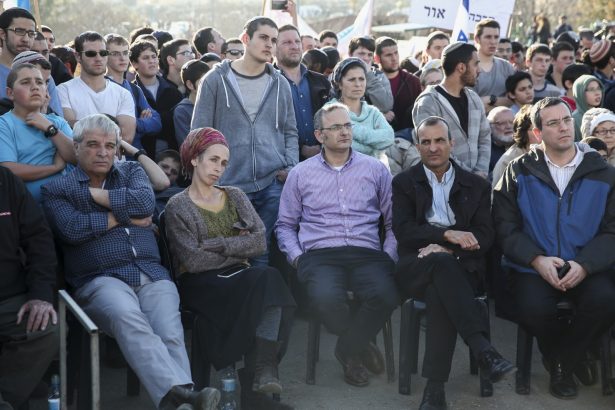With only one week to go until election day, the fate of the territories has barely been mentioned. Yisrael Medad explores why, suggesting that most Israeli Jews now support ‘the idea that Jews belong in Judea and Samaria and believe that all or most of them should stay’. Indeed, after a Likud victory, pressure for partial annexation may be brought to bear in the coalition talks.
With only seven days left in the election campaign for the 21st Knesset, the future of the territories of Judea and Samaria (the West Bank) has been almost a non-issue since the Knesset dissolved itself at the end of December. Even when it finally got a bit of public attention, it was due to the decision of US President Donald Trump to announce on 25 March that the US ‘recognises that the Golan Heights are part of the State of Israel’ and, understandably, questions were asked about whether this would affect policy towards the territories in the West Bank.
To date, Prime Minister Benjamin Netanyahu has made only one high-profile visit to a West Bank community, my home village of Shiloh, (although even then it was only to the archaeological Tel with former Arkansas governor Mike Huckabee rather than to the community itself.) He did make shiva / consolation visits to the families of West Bank terror victims, as did President Reuven Rivlin. And he also conducted a business meeting with heads of regional and municipal councils. But this was a closed session and was more a report on Netanyahu’s government’s achievements in resettling Jews in their national homeland. A perfunctory summary statement referred to the prime minister saying he was ‘working on empowering Israel in the arena of security, economics and diplomacy’.
Why has the issue of the territories, with over 450,000 Jewish residents, been so little discussed?
Are settlements now within the consensus?
One possible reasoning for the low-profile is that, quite simply, most of the parties, except for the extreme Left and the Arab lists, all support – whether fully or partially – the idea that Jews belong in Judea and Samaria and believe that all or most of them should stay within blocs or some other arrangement. In other words, from Netanyahu to Benny Gantz, Labor leader Avi Gabbay to New Right leader Naftali Bennett, Jews remaining in their communities is a general consensus item.
While I’m not a fan of surveys – it is often the formulation of the question that influences the results – a Haaretz poll from 5 March found that 42 per cent of Israelis support partial annexation – rather than some vague retention – of the West Bank (a figure that also includes those who support a two-state solution!) According to the poll, 34 per cent support a two-state solution, which only three parties openly promote. Oddly enough, 20 per cent of non-Jews support complete annexation of the West Bank.
Why is this the case? Firstly, Israel has administered the territories for almost 52 years. Not only first-time voters, but a good proportion of their parents have not known any other reality. Secondly, the Arab rejection of any sensible peace arrangement negotiations, their unyielding negation of Jewish national identity and incitement campaigns, and the ‘pay-for slay’ terrorism pension support all point to a serious security threat and a sense of uselessness on Israel’s part to try to assuage this Arab negativism. Even among many left-of-Centre Israelis, the idea that dismantling communities in the West Bank would solve the conflict (rather than making them feel more ethical and acceptable in liberal and progressive circles), is becoming increasingly difficult to convincingly argue.
Settlement issues and coalition negotiations
This support for settlements exists despite the fact that parties to the right of the Likud have been promoting the extension of partial sovereignty to Area C as well as below-the-surface severe criticism of Netanyahu for reduced construction, removal of several outpost communities and neighbourhoods, and his perceived failure to confront the lopsided legal obstructionism. Netanyahu’s unwillingness to remove the EU-promoted Khan al-Ahmar Bedouin encampment was even an object of ads in the press. All of this means that if the Likud does form the next governing coalition, pressure surrounding these issues will be brought to bear in the coalition talks with the various parties, especially the United Right list. In this respect, observers of Israel’s political process need to know that the next election campaign begins on the morrow of the last one.
What could go wrong?
One worry is the potential return to the ‘trauma of 1992’ when too many right-wing politicians presumed there was a large bank of voters and the dilution of votes between them caused parties to fail to cross the threshold and thus disappear. While that scenario has perhaps been prevented by uniting three separate lists into one (Jewish Home, National Union and Jewish Power), it came at the cost of merging, even if only in a technical bloc, with a party identified as too extreme even for the Yesha Council.
Despite portrayals of West Bank residents as fanatics or worse, the majority of 450,000 Jews in the communities have shunned the very few who engage in direct physical violence against Arabs. The Yesha Council has always pleaded with the police to arrest the very few ‘hilltop youth’ who may be involved in criminal activities. In fact, proactive educational and social worker programmes have been initiated by several of the larger regional councils to a saner, more ethical and more legal response by these rebellious youth for whom the Jewish Power lure has become enticing. Submerging Jewish Power’s candidates within the United Right bloc may prove to be a moderating force on the party and not as others have framed it.
And then there is Moshe Feiglin’s Zehut party. If polls are to be believed, from barely scratching the electoral threshold barrier of 3.25 per cent, Feiglin is now showing public support that could gain him between six and seven seats, which would potentially make him a kingmaker for either Netanyahu or Gantz. Feiglin has been reportedly drawing votes from both right-wing and left-wing circles. And in contrast to the leaders of other right-wing and ultra-Orthodox parties, he has specifically not committed to recommending Netanyahu for prime minister. Despite being a resident of Karnei Shomron in the Samaria region, some fear that his personal animosity to Netanyahu – who all but threw him out of the Likud in the run-up to the 18th Knesset / 2009 elections – may affect his political decisions in who to recommend become the next prime minister. Certainly, his quirkiness and recent political maneuverings are, to use a pun, unsettling for many in the Yesha leadership.






































Comments are closed.